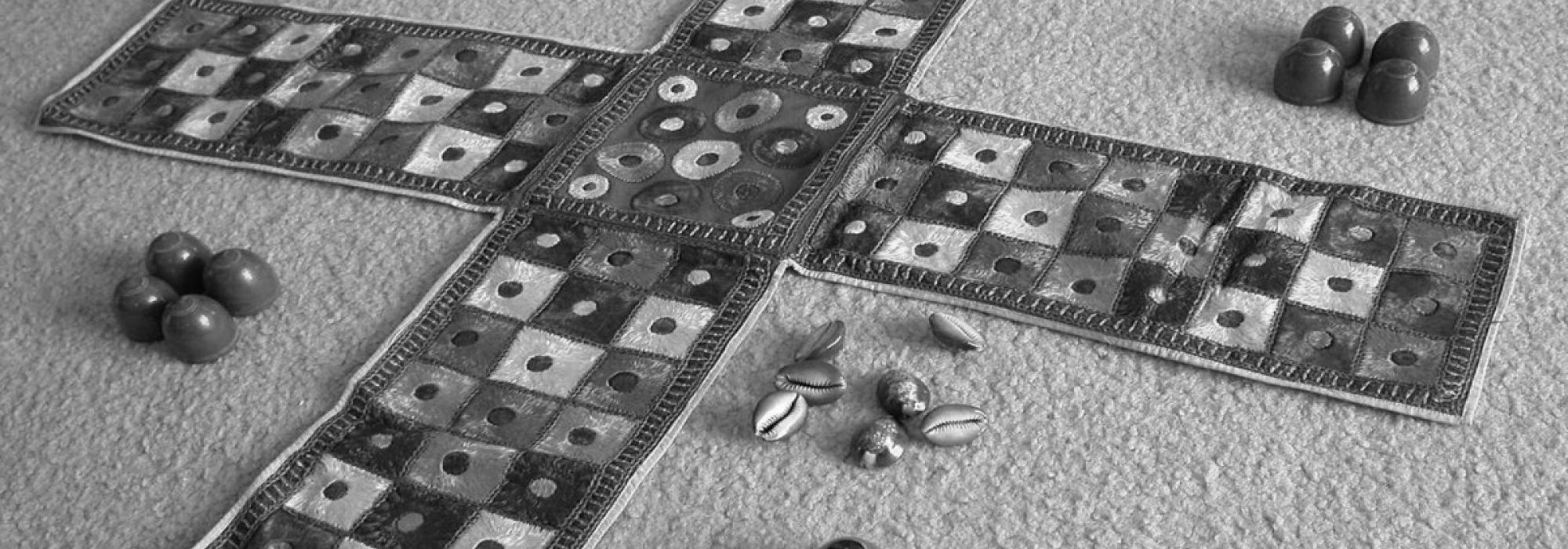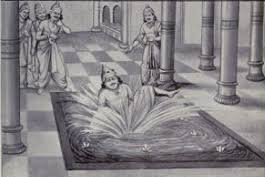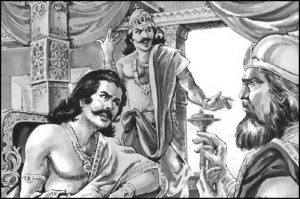Thus, all the impediments that had come in the way of performing the Rājasūya-yāga were removed; Yudhiṣṭhira completed the yāga successfully under the protection of Kṛṣṇa. All the guests returned to their hometowns after seeking his permission. Yudhiṣṭhira gave them bountiful gifts and bade them farewell with great affection. Kṛṣṇa too expressed his wish to return to his city of Dvārakā. Yudhiṣṭhira expressed his gratitude to Kṛṣṇa and said, “Thanks to your benevolence, the yajña went off well and the kings offered tributes. We cannot live without you, Kṛṣṇa, but what can we do? Seems like it’s inevitable for you to go Dvārāvatī!” The two then went together to see Kuntī. Kṛṣṇa said, “Dear aunt, your children have procured their kingdom and have become prosperous. You may live happily hereafter. I shall take leave.” He requested her permission to leave. He met Subhadrā and Draupadī, bid them farewell and returned to Dvārakā. Even after everyone else returned to their hometowns, Duryodhana and Śakuni stayed back at Indraprastha. When Duryodhana was at the palace of Pāṇḍavas, he was mesmerised by the sculptural and architectural beauty of the place. He had not seen such grandeur in Hastināpura. He once mistook the crystal-laden flooring for water and pulled up his clothes foolishly. Having realised that it was not water, he put his head down in shame and walked away briskly. On another occasion, he came across a pond that had pure water and lotuses glimmering like crystals. He mistook the real pond for crystals and stepped into it. He fell into the pond and his clothes got wet. Everyone around laughed looking at him; on his command, his servants got him fresh clothes. Bhīma and Arjuna too saw him in that state and were unable to control their laughter. Duryodhana was thus put to great shame and went away hiding his face. As he was walking away, he once again mistook the flooring for water and was ridiculed by the people around. Similarly, he would try to go through a wall that looked like open doors and would bump his head. He would stop by doors which looked like a wall. He was thus disillusioned several times and was subject to a lot of ridicule during his stay there. On one hand, he had to face many such instances and on the other, he was jealous looking at the prosperity of the Pāṇḍavas. All this started troubling his mind. His mind was filled with thoughts about the wealth and the glory of the Pāṇḍavas as well as their grand palace. Śakuni tried hard to strike a conversation with him on their way back but he remained silent. Looking at this, Śakuni asked, “Duryodhana, you seem to be lost in thoughts, why? Often you sigh in despair. Duryodhana said, “Uncle, due to Arjuna’s skill at archery, the entire earth has come under Yudhiṣṭhira’s rule. My insides burn looking at the great yāga that could only match Devendra’s yajña. There was no man who could stop Kṛṣṇa from killing Śiśupāla! It seems to me that they tolerated the scene because they were all psychologically burned in the fire lit by the Pāṇḍavas. If not, who can pardon that act? All the kings, like vaiśyas, brought heaps and heaps of precious gems and jewellery and offered it as tribute to the Pāṇḍavas. My whole body boiled with rage looking at the dazzling mountain of precious stones. I did not know if I should fall into a fire, drink poison, or drown myself in water. I will not be able to live and I can seek nobody’s help. Thus, I am thinking of death! Fate is greater than free-will! I took great efforts to kill them in the past. They overcame all that and have blossomed like a lotus in a pond. They have now acquired so much wealth. The Kauravas are diminishing day by day and are becoming inferior to them. My insides burn when I recall the grand palace, the wealth, and the laughter let out by the servants looking at me. I am in great distress. Please let my father know of this.”
Śakuni said, “Duryodhana, be patient. Don’t lose your composure! The Pāṇḍavas are enjoying the luxuries that have come their way by the play of fortune. They were lucky to be able to dodge your strategies. Thanks to their good fortune, they married Draupadī and gained the favour of Drupada and his son. They even got the assistance of Vāsudeva and procured a large kingdom. With their might, they expanded their share of the ancestral kingdom. Why do you need to worry about this? Yajñeśvara was pleased with Arjuna and awarded him the Gāṇḍīva and a quiver with infinite arrows. With this, he won over several kings. Why should you get worked up about this? They saved Mayāsura from the fire and got the sabhābhavana (assembly house) built. You don’t have to worry about any of these. It is not true that you have nobody on your side. You have brave brothers. Droṇa, an expert archer, is on your side. Kṛpa, Karṇa, and I are with you always. My brothers and Somadatta are also on your side. You take their help and win over the earth!” Duryodhana said, “Uncle, if you give your consent, I shall win over the Pāṇḍavas with the assistance of all these people. If I defeat them, their entire kingdom will be mine. All the kings will become my subordinates. That grand palace will also become mine!” Śakuni said, “Not even the devatās can defeat Arjuna, Vāsudeva, Bhīmasena, Yudhiṣṭhira, Nakula, Sahadeva, Drupada, and his children. However, I have an idea to defeat Yudhiṣṭhira. I will tell you, listen to me! He’s fond of gambling, but doesn’t have the skill to play it well. He will not refuse when invited to gamble. I’m an expert at the game of dice and there is no one who can beat me. Thus, invite him for a game of dice. I shall surely defeat him in gambling and will win his wealth and kingdom for you. Let your father know of all this; if he agrees, consider victory to be yours!” Duryodhana said, “I will not be able to tell all this to my father; you please convey it to him in a skilful manner.” Accordingly, Śakuni waited for the right moment and went to Dhṛtarāṣṭra. He said, “Revered king! Duryodhana is in great sorrow and has completely gone down! When your oldest son is in such a state, would you not ask him the reason for it?” Dhṛtarāṣṭra called for Duryodhana and asked, “Dear child, why are you so depressed? Please tell me, if I may hear it. You have inherited all our wealth; your brothers and friends always support you; you have ample resources for enjoyment – food, drinks, and women; all your wishes are executed with utmost care. This being the case, what is the reason for your sorrow?” Duryodhana said, “Well, I am able to fill my stomach and cover my body with clothes, true! Even a stray person will be able to procure such basic needs! I’m in great pain thinking about the grave turn Time has taken; he who guards himself from troubles caused by enemies indeed lives; contentment and self-respect destroy wealth; a person who’s worried and scared can never grow big; looking at the prosperity of Yudhiṣṭhira, I’m unable to digest the food I eat and so I’ve become emaciated. Our cousins are growing in prosperity and we’re going down. Thinking of this brings their images to my mind although they are far away. I’ve lost my health due to this. Yudhiṣṭhira takes care of eighty-eight-thousand graduates and households; each has about thirty servants; everyone in their palace uses golden utensils to partake of food. I’ve never seen such heaps of gems that were offered to them as tribute during the yāga. The palace was so full that there was no place for the people who came to offer tributes; they eagerly waited in a long queue by the door. Looking at that, I began getting bouts of fever. As soon as ten thousand guests had eaten their meals, a conch was blown. Several such soundings of the conch reverberated in the place once after the other. My hairs stood on end hearing that sound. Indra, Yama, Varuṇa, Kubera – no one can match Yudhiṣṭhira’s prosperity; my heart is in deep pain looking at all this. I have no peace!”
Śakuni said, “Listen, I will suggest a plan to acquire all the wealth that Dharmarāja currently possesses. I know the art of playing the dice-game. Dharmarāja likes the game but doesn’t know how to play it. If we invite him to gamble, he will surely come!” Duryodhana sought his father’s approval by saying, “Father! Let us do as uncle says!” Dhṛtarāṣṭra said, “Let us consult Vidura once. He is a wise man. He gives sound advice. He can think from the perspective of dharma and can foresee what is good for us in the long run. He will be able to guide us on a course of action that will favour both the parties!” Duryodhana, however did not like the idea. “Once Vidura comes, he will change your mind; if you change your mind, it is better that I give up my life! And once I am dead, you rule the kingdom peacefully with the help of Vidura. Of what use am I to you, after all?” Listening to the words of Duryodhana, Dhṛtarāṣṭra was moved and agreed to Śakuni’s suggestion. He ordered the architects to build a beautiful enclosure with a thousand pillars and a hundred doors. Once the building was ready, he called for Vidura and put forward the proposal of calling the Pāṇḍavas for a game of dice. Dhṛtarāṣṭra never did anything without consulting Vidura. He was also aware of the ill-effects of gamble. But his affection for his son was pulling him in a different direction. Vidura heard Dhṛtarāṣṭra’s words and thought, “Seems like Kaliyuga has arrived and destructive times are at the door!” He said “O King! I will not support this kind of activity; the brothers will fight amongst themselves because of such gambling.” Dhṛtarāṣṭra said, “Why will they quarrel, Vidura? The devatās will do good to us. Let the cousins play a friendly game; let us not worry whether it is right or wrong; it seems like this is the will of the deities. When Bhīṣma, you, and I are around, nothing untoward can happen. Get a chariot ready and go to Khāṇḍavaprastha. Please bring them here!” Vidura had no choice but to listen to his elder brother’s words. He left for Khāṇḍavaprastha with tears in his eyes. Dhṛtarāṣṭra tried to give good counsel to Duryodhana when he was alone. “Gambling is bad, please don’t do it. You are the eldest of our sons, you should not develop hatred. You too perform a yāga; you will receive great tributes too. The Pāṇḍavas are strong; don’t gain their enmity!” But none of these touched Duryodhana’s heart.
To be continued…
This is an English translation of Prof. A R Krishna Shastri’s Kannada classic Vacanabhārata by Arjun Bharadwaj and Hari Ravikumar published in a serialized form. Thanks to Śatāvadhāni Dr. R Ganesh for his thorough review and astute feedback. Additional segments from the epic and notes by the translators have been added in the footnotes after going through the Critical Text of the Mahābhārata.



















































